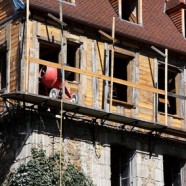Electrical Contractor Costs: Factors in Renovating Your House
Older homes in south Florida may have classic looks, but renovating them will almost always include replacing old wiring and fuse boxes. The amount of renovation needed depends on safety and building code requirements. Depending on whether you’re replacing a fuse box or rewiring an entire guest house, your electrical contractor costs can vary widely. A wide variety of factors affect your final costs, depending on how much you can do yourself, and how complicated the final project becomes.
Do it Yourself
If you’ve successfully completed other home projects, you may feel as if you can do a home rewiring project, saving money for other parts of the renovation. If your only upgrade is to add a ceiling fan or to replace a switch plate, that may be true, but getting a professional is best for anything more elaborate than that. The safety considerations alone are enough to steer you in this direction, but the cost of fixing mistakes made through inexperience can be higher than the original price of the job done right.
Supplies
The cost of your job will depend partly on what supplies you’ll need to finish the job. These can include:
- Filing and pulling a permit to wire your home
- Wiring, outlet covers, switches, and breaker box
- Conduit
- Supplies for repairing walls if needed for access to old wiring
Building Permits
While the cost of a building permit for wiring your renovation job will be the same whether a professional electrician pays for it or you do, a commercial electrical contractor knows exactly what kind of permits are needed and how the local permit process works. He knows exactly what information and paperwork will be needed in order to receive a permit, and which permits you’ll need to get in order to make your project legal and up to code in your neighborhood.
Electrical Panels
If you have one of the classic Art Deco older homes in south Florida, and it hasn’t had its electrical wiring updated in the last few decades, you may be living in a house with an old-fashioned fuse box. Not only is this expensive, it can also be unsafe to use. It’s definitely a sign that the wiring may need replacing. Fuse boxes should always be replaced with modern circuit breakers, which can handle today’s electrical demand much better than its older cousin. Putting in a new circuit breaker will definitely factor in electrical contractor costs, but it can pay for itself in safety features and possible home insurance premiums.
Estimating and Lowering Materials Costs
While you can’t know the final total for renovation and rewiring costs until the job is done, it’s possible to estimate the costs and make an effort to reduce them during the work process. New outlets and switches will have to be installed when a room is rewired, but if you can reuse your old outlet covers and switch plates you’ll save some money on those supplies. If your ceiling fan is still in good condition, your electrical contractor will be able to install it back in place once the wiring is finished without any additional cost for a new fan.
Replacing any outlets or switches can cost between $70 and $120 per item, depending on where the items are placed and whether other wiring has to take place in order to do a successful job. The copper wire itself can be one of the most expensive elements in a renovation project. It can run over $1,000 for a small bungalow-type house, and over $3,000 for larger, multi-bedroom family homes.
Read MoreElectrical Considerations for Renovating a Home
It’s always a smart idea to check and update the wiring in a home when taking on a renovation project. The wiring itself is often less work than actually accessing the works inside walls and flooring, so the best time to work on them is when the bones of the house are already showing. Age is always a factor when it comes to electrical work; if your home is more than 30 years old, it probably has outdated wiring and inadequate power outlets. Keep your family and the next 20 years in mind when deciding on how much electrical work to do while you’re renovating a home.
Planning for the Future
Technology tends to creep, and the total quantity of electronic gadgets in a home generally increases every year. This means a bigger need for electrical outlets in every room in the house. Look at what your family uses right now and double the number of outlets you think you need. Renovating a room or house is a major project, and something you won’t want to do any more often than necessary.
Pay attention to daily tasks your family does now, and those likely to be common in the next ten years or so. These might include:
- Recreational reading
- Crafts and hobbies
- Using a computer
- Gourmet cooking
Each of these activities will have special electrical needs, from extra outlets in a kitchen for the gourmet cook to special corner task lighting for a reading nook. Adding extra outlets is rarely a bad thing, especially in the busiest parts of your house.
Updating for Flexibility and Safety
Convenience is one reason to update your electrical wiring, but safety and flexibility of use can be even more important. Older wiring can fray and become a fire hazard, and homes with fuse boxes or inadequate circuit breakers can be safety hazards, as well. It makes sense to check out all the wiring and electrical installations in a room or portion of the home when taking it apart for renovation. Even if you only decide to upgrade a portion of the room, you’ll have peace of mind knowing the wiring left behind is safe for your family.
One way to save money on a new wiring system when you’re renovating a home is to use the old conduits, if the wiring plan hasn’t changed too much. These major installations have already been shown to be safe and logical ways to deliver power and protect wiring. If you find you can use much of the same older wiring plan, then using the old conduit will save you a significant amount of money on the upgrade.
Use a Professional Electrical Contractor
General contractors and handymen are useful for many types of home improvement project, but when it comes to the wiring planning and execution in your home, you need to use a licensed professional electrician. An experienced professional will sit down with you from the first day to coordinate an electrical plan with your renovation and remodeling ideas. He knows building codes and safety issues having to do with electrical work, and can offer improved and alternate ideas for your upgrade plan. A local professional will also know the local building codes, and can pull permits for doing work on your project. He can work with you on the original blueprint and offer suggestions on how to improve on your electrical system for both safety and economy.
Contact us to discuss your electrical needs when you’re renovating a house.
Read More


Recent Comments